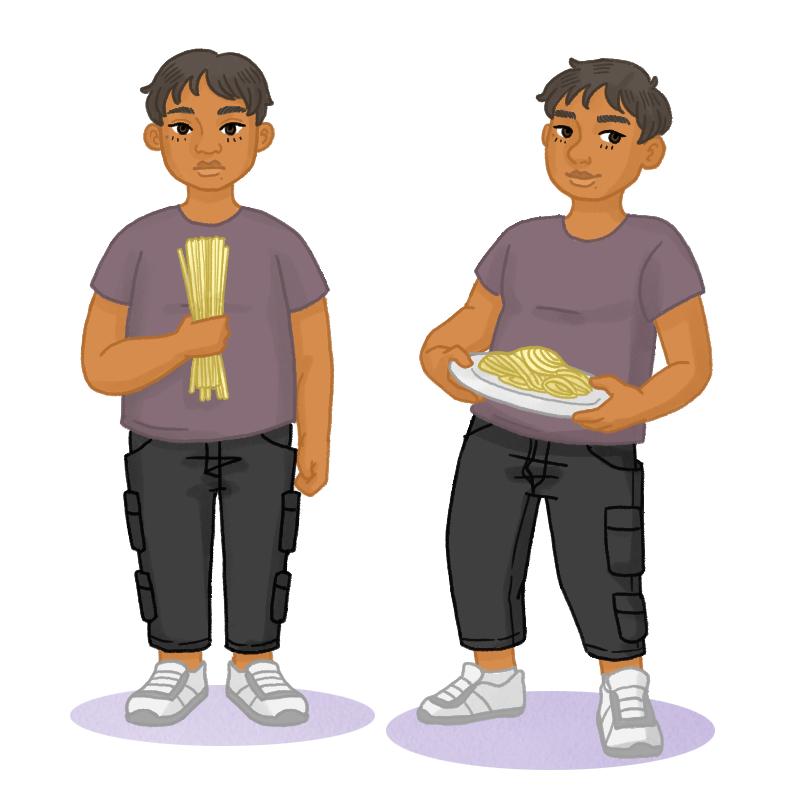





Chapter 3. Progressive Muscle Relaxation Copy

“Ok, the next tool is called progressive muscle relaxation,” you say. “It’s similar to deep breathing in that it helps to manage physical reactions in the body. Let me ask you a question, Nelson.”
He perks up in his seat.
“What do you think happens to our muscles when we get stressed?”
Nelson looks sideways at the floor as he purses his lips in thought. He looks back up at you. “I don’t know.”
“Do you think they relax themselves, in the same way that deep breathing allows us to relax our muscles?”
Nelson shakes his head in silence, waiting for you to enlighten.
“Well, if they don’t get relaxed, then perhaps…” You trail off, waiting for him to fill in the blanks.
“They become tense?”
“Yes!” you exclaim as you nod once, emphatically. “Think of it this way: have you ever seen spaghetti after it has been cooked?”
Nelson bursts out into laughter. “Yeah, I tried to make it myself once when Mom was away.”
“Do you remember how it turned out?”
“Terrible,” he quickly replies, shaking his head at the memory. “Like, overcooked.”
You laugh heartily. “Well, overcooked or not, the noodles get kind of limp and loose, right? That’s exactly how our muscles are when we’re relaxed.”
You notice Nelson licking his lips involuntarily.
“So, during progressive muscle relaxation,” you continue, “we tense our muscles on purpose to think about how they feel when we are stressed, then compare that to how they feel when we’re relaxed. Switching back and forth helps to loosen our muscles.”
Nelson closes his fists, and cocks his head to the side with a scowl. “But I don’t want my muscles to be relaxed! I want them to be strong! What if something attacks me? I have to be prepared!”
His outburst catches you by surprise, but you retain an even keel.
“Yes, that’s true,” you say reassuringly, “we do want you to be prepared. But it’s impossible to be tense and relaxed at the same time, and there are many instances when your body needs to relax. If your body is tense all the time, it’s going to wear you out, make you more tired, and make you more stressed in the long term, which will make you less prepared. That’s why we’re teaching you ways to relax so you can be ready.”
Nelson loosens his grip and slackens his shoulders. “I see,” he mutters.
“Why don’t we give it a try?” you ask encouragingly. “Sit comfortably just like we did for deep breathing.”
Nelson immediately begins adjusting his seat.
“Take a few slow breaths to relax. When you’re ready, raise a finger to let me know.”
You watch Nelson closely as he breathes. After a beat, he raises a finger and opens his eyes.
“Alright. We’ll go through each muscle group and try to tense them. Really focus on that specific area and tighten up. Hold that tightness for ten seconds, and then relax. We’ll do each group three times. Sound good?”
Nelson nods once.
“Let’s start with your feet,” you say as you lean forward to look down at your own feet. “Scrunch up your feet like you’re digging your toes in the sand. Keep doing that for 10 seconds.”
Nelson grimaces slightly in concentration for 10 seconds.
“And relax,” you conclude with a sigh. “Ok now tighten again.”
You and Nelson both “dig your toes” and cycle through those steps twice more.
“How are your feet feeling?
“I could feel the tightness.”
“That’s great,” you say with a smile. “What muscles should we move to next?”
Nelson looks up at the ceiling. “Maybe my hands.”
“Great choice,” you proclaim. “Let’s give them a try then. Clench your hands like you’re squeezing juice out of a lemon. That’s right, now hold for ten seconds.” You cycle through the steps two more times.
“How do your hands feel?”
“I can feel the blood rushing through them,” Nelson replies as he shakes them out.
“Are we going to do all the muscle groups every time?” Nelson asks with a frown.
“You can do the whole sequence when you have time,” you explain. “Otherwise, just do as many muscle groups as you can. You can even do some in bed because this is a good tool to help you fall asleep.”
“Oh, really?” Nelson asks, wide-eyed. “That’s good to know, because sometimes I can’t fall asleep. I’m just thinking about my day the whole time. I’ll try this tonight.”
“Good idea! Okay, which group should we do next?”
